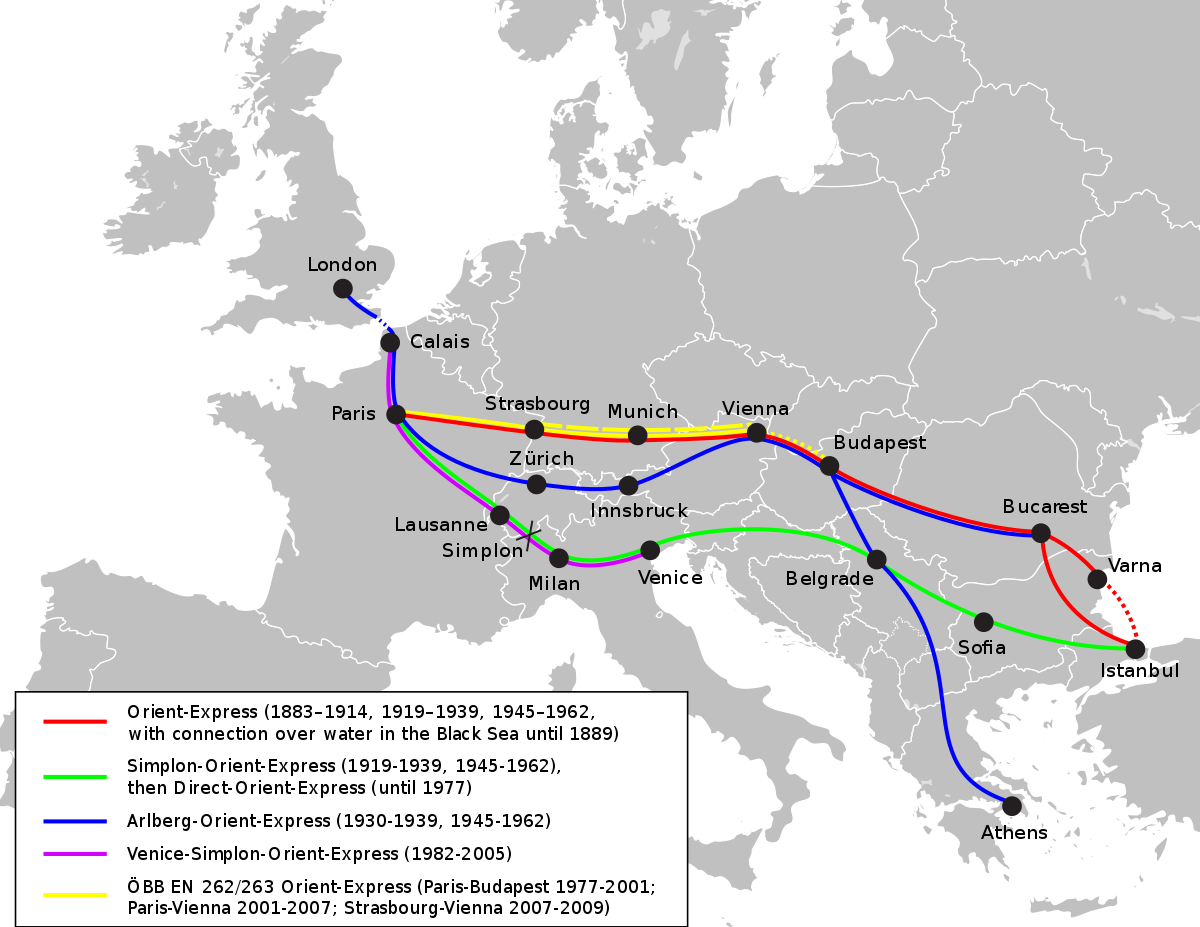Orient Express
Rae West 15 Jan 2017, 18 Feb 2022

People musing over the immense disaster of the Second World War, and the intricate spun olefin barriers to understanding extruded by Jews, might like a look at the fairly short span of time for which railways provided a luxurious mode of fast travel, with possibilities for moving people and valuables. Metternich travelled in a coach-and-four, or perhaps six; then steam transport was invented. Its fixity makes it more easily studied than sea, motor, or air travel.
The far point, Istanbul/Constantinople, had significance for the British Empire, German Empire, and Jews.
Baron Maurice de Hirsch (1831-1896. I don't know if the title was honorary) was one of the emblematic figures of the nineteenth century, described as a 'Jewish philanthropist'. Today Hirsch is less well known than the Rothschilds yet to his contemporaries he was the embodiment of the gilded age of Jewish philanthropy. (As they say!)
Hirsch's vast fortune derived from his role in creating the first rail line linking Western Europe with the Ottoman Empire, what came to be known as the Orient Express. (I haven't tried to check this. He seems a bit early to be involved with rail transport as a money-maker. Albert Ballin (1857-1918) Jewish ship magnate seems a comparable figure.) And note: it's very typical of accounts of Jews that numbers are never given for 'vast fortunes'). Socializing with the likes of the Austrian crown prince Rudolph and "Bertie," future King Edward VII, Hirsch rose to the pinnacle of European aristocratic society, but also found himself the frequent target of vicious antisemitism. (Typically, Lehmann does not say if it was accurate. Many aristocrats loathed the phonies).
Responding to the crisis wrought by the mass departure of Jews from the Russian Empire at the turn of the century, Hirsch established the Jewish Colonization Association, with the goal of creating a refuge for the Jews in Argentina. (This probably means he was part of the movement to shift Jews west). When Theodor Herzl, the founder of Zionism, advertised his plan to create a Jewish state (not without inspiration from Hirsch), he still wondered whether to do so in Palestine or in Argentina—and left the question open.
[Taken from Matthias B. Lehmann, of the "Teller Family Chair in Jewish History" in California. Teller probably the fraudulent physicist].
However, Disraeli died in 1881 before this line operated; and the Crimean War was over some time before. But their significance must have been noted. The Jewish link was Jewish presence both in Russia and in Turkey (and Arabia later, when oil was discovered).
Orient-Express (1883-1914) (red on the map) must have been important in the preparations for the First World War; Jews from Europe could be carried to Versailles to plan their Europe-wrecking schemes. It was (I think) a French engineering project; London was linked in at some point, but there was inevitably a channel-crossing interruption.
1919-1939 added the route through Simplon in Switzerland, and swept south of Germany and what was Austria-Hungary.
Another route, 1930-1939 (blue on the map) went to Zurich in Switzerland, terminating in Athens. No doubt the Swiss connection was related to the new Bank for International Settlements.
The two other lines, purple and yellow on the map, look to me like holiday/ vacation/ tourist routes.
There are many trains notorious in these wars: for example, a 'sealed train' from Germany carrying Jews to Moscow. Trains for Trotsky, planning mass killings. And the trans-Siberian express. There must have been trains to Rome, Kiev, Madrid. And even trains in the USA, moving Jews planning the Fed swindle.
Baron Maurice de Hirsch (1831-1896. I don't know if the title was honorary) was one of the emblematic figures of the nineteenth century, described as a 'Jewish philanthropist'. Today Hirsch is less well known than the Rothschilds yet to his contemporaries he was the embodiment of the gilded age of Jewish philanthropy. (As they say!)
Hirsch's vast fortune derived from his role in creating the first rail line linking Western Europe with the Ottoman Empire, what came to be known as the Orient Express. (I haven't tried to check this. He seems a bit early to be involved with rail transport as a money-maker. Albert Ballin (1857-1918) Jewish ship magnate seems a comparable figure.) And note: it's very typical of accounts of Jews that numbers are never given for 'vast fortunes'). Socializing with the likes of the Austrian crown prince Rudolph and "Bertie," future King Edward VII, Hirsch rose to the pinnacle of European aristocratic society, but also found himself the frequent target of vicious antisemitism. (Typically, Lehmann does not say if it was accurate. Many aristocrats loathed the phonies).
Responding to the crisis wrought by the mass departure of Jews from the Russian Empire at the turn of the century, Hirsch established the Jewish Colonization Association, with the goal of creating a refuge for the Jews in Argentina. (This probably means he was part of the movement to shift Jews west). When Theodor Herzl, the founder of Zionism, advertised his plan to create a Jewish state (not without inspiration from Hirsch), he still wondered whether to do so in Palestine or in Argentina—and left the question open.
[Taken from Matthias B. Lehmann, of the "Teller Family Chair in Jewish History" in California. Teller probably the fraudulent physicist].